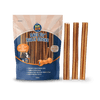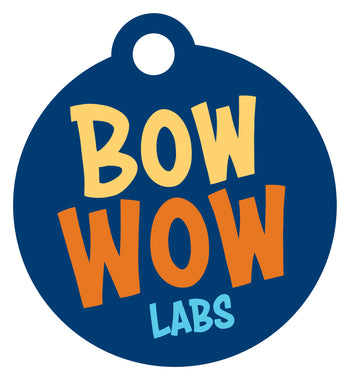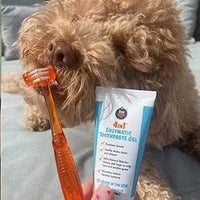When it comes to our dogs' diets, we often focus on the basics: ensuring they get the right amount of protein, fats, and carbohydrates. However, just like in humans, the quality of these nutrients is crucial for their overall health. Feeding our dogs ultra-processed and refined ingredients may seem convenient, but it comes at a cost. These types of foods and treats are typically high in unhealthy fats and excessive carbohydrates and include sugars or sweetening agents. Such ingredients can lead to oxidative stress in your dog's body, resulting in cellular damage.
Understanding Oxidative Stress and Free Radicals
Oxidative stress occurs due to an imbalance between free radicals and antioxidants in the body. Free radicals are unstable molecules that can cause significant harm, including accelerating aging, promoting inflammation, and increasing the risk of disease. It's essential to modify your dog's eating habits to include foods that balance these free radicals and support overall health.
The Role of Antioxidants
Antioxidants are compounds that neutralize free radicals, preventing them from causing damage. Increasing the amount of antioxidants in your dog’s diet is a key step towards enhancing their health. Antioxidants are abundant in various fruits and vegetables, particularly those with vibrant colors. These colorful plant foods contain polyphenols and antioxidants that also exhibit anti-inflammatory properties. The richer the color of the produce, the higher its polyphenol content, which helps repair cellular damage and maintain overall health.
Incorporating Antioxidant-Rich Foods into Your Dog’s Diet
Safe Fruits and Vegetables
One easy way to boost your dog's antioxidant intake is to introduce a variety of safe fruits and vegetables into their daily diet. Aim to include vibrant-colored fruits and vegetables such as blueberries, blackberries, strawberries, red cabbage, green leafy vegetables, apples, and carrots. Ensure that all recommended foods are safe for canine consumption, as some fruits and vegetables can be toxic to dogs (e.g., grapes, and onions).

Spirulina: A Superfood
In addition to fruits and vegetables, spirulina, a blue-green algae, is an excellent source of antioxidants for your dog. Spirulina contains phycocyanin, a polyphenol with incredibly high levels of antioxidants. It also has brain-protective properties and acts as a prebiotic, feeding beneficial bacteria in the gut and reducing cellular damage and inflammation.
Practical Tips for Feeding Antioxidants to Your Dog
- Smoothies for Dogs: Prepare smoothies using safe, fresh fruits and vegetables, adding spirulina powder for an antioxidant boost. This is a convenient and palatable way to ensure your dog gets their daily dose of antioxidants and can be added right to their food bowl or given as a frozen, lickable snack!
- Whole Foods: Whenever possible, opt for local, in-season produce to ensure maximum nutrient retention. These fruits and vegetables are usually harvested at peak times when they are most nutrient-dense. This means they’ve reached their highest potential for vitamins, minerals and antioxidants.
- Organic Choices: Choose organic fruits and vegetables to minimize exposure to toxins and pesticides that can negate the health benefits of these foods.
Recommended Daily Intake
For optimal health benefits, aim to include at least 3–5 vibrant-colored fruits and vegetables in your dog's diet each day while ensuring they don’t exceed 10% of their daily intake. Raw vegetables and fruits are best, but you must puree or finely chop them for optimal digestion and nutrient absorption.
Conclusion
Enhancing your dog's diet with antioxidant-rich foods can greatly impact their health, helping to neutralize free radicals, reduce inflammation, and support cellular repair. By making small changes and incorporating a variety of colorful fruits and vegetables, as well as superfoods like spirulina, you can ensure your dog leads a healthier, happier life. Always consult with a veterinarian before making significant changes to your pet's diet to ensure the dietary adjustments are safe and beneficial.
The points of view expressed above are those of our clinical pet nutritionist and supported by science, her education and experience. However, we recognize there may be different points of view or opinions on some aspect or even the premise of this article. Our goal at Bow Wow Labs is to provide the best, clearest, and most helpful information possible to help keep your dog happy, healthy and safe.
This article is for informational purposes only. It is not, nor is it intended to be, a substitute for professional medical or veterinary advice, diagnosis, or treatment and should never be relied upon or perceived as specific medical or veterinary advice.















